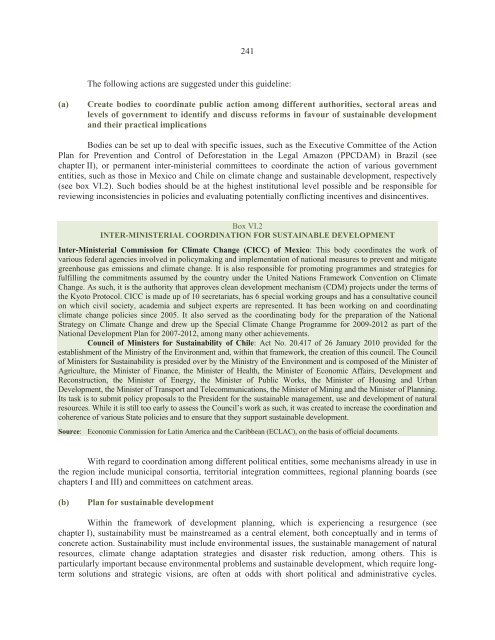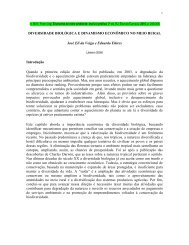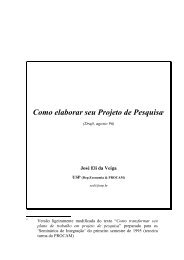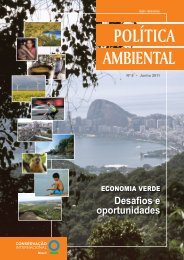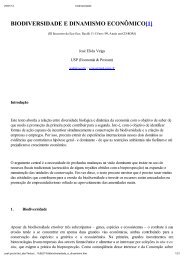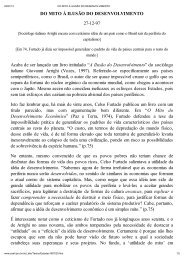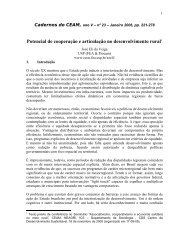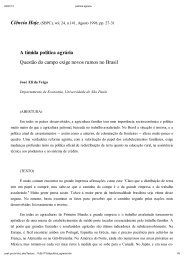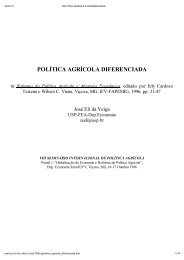sustainable development 20 years on from the ... - José Eli da Veiga
sustainable development 20 years on from the ... - José Eli da Veiga
sustainable development 20 years on from the ... - José Eli da Veiga
You also want an ePaper? Increase the reach of your titles
YUMPU automatically turns print PDFs into web optimized ePapers that Google loves.
241<br />
The following acti<strong>on</strong>s are suggested under this guideline:<br />
(a)<br />
Create bodies to coordinate public acti<strong>on</strong> am<strong>on</strong>g different authorities, sectoral areas and<br />
levels of government to identify and discuss reforms in favour of <str<strong>on</strong>g>sustainable</str<strong>on</strong>g> <str<strong>on</strong>g>development</str<strong>on</strong>g><br />
and <strong>the</strong>ir practical implicati<strong>on</strong>s<br />
Bodies can be set up to deal with specific issues, such as <strong>the</strong> Executive Committee of <strong>the</strong> Acti<strong>on</strong><br />
Plan for Preventi<strong>on</strong> and C<strong>on</strong>trol of Deforestati<strong>on</strong> in <strong>the</strong> Legal Amaz<strong>on</strong> (PPCDAM) in Brazil (see<br />
chapter II), or permanent inter-ministerial committees to coordinate <strong>the</strong> acti<strong>on</strong> of various government<br />
entities, such as those in Mexico and Chile <strong>on</strong> climate change and <str<strong>on</strong>g>sustainable</str<strong>on</strong>g> <str<strong>on</strong>g>development</str<strong>on</strong>g>, respectively<br />
(see box VI.2). Such bodies should be at <strong>the</strong> highest instituti<strong>on</strong>al level possible and be resp<strong>on</strong>sible for<br />
reviewing inc<strong>on</strong>sistencies in policies and evaluating potentially c<strong>on</strong>flicting incentives and disincentives.<br />
Box VI.2<br />
INTER-MINISTERIAL COORDINATION FOR SUSTAINABLE DEVELOPMENT<br />
Inter-Ministerial Commissi<strong>on</strong> for Climate Change (CICC) of Mexico: This body coordinates <strong>the</strong> work of<br />
various federal agencies involved in policymaking and implementati<strong>on</strong> of nati<strong>on</strong>al measures to prevent and mitigate<br />
greenhouse gas emissi<strong>on</strong>s and climate change. It is also resp<strong>on</strong>sible for promoting programmes and strategies for<br />
fulfilling <strong>the</strong> commitments assumed by <strong>the</strong> country under <strong>the</strong> United Nati<strong>on</strong>s Framework C<strong>on</strong>venti<strong>on</strong> <strong>on</strong> Climate<br />
Change. As such, it is <strong>the</strong> authority that approves clean <str<strong>on</strong>g>development</str<strong>on</strong>g> mechanism (CDM) projects under <strong>the</strong> terms of<br />
<strong>the</strong> Kyoto Protocol. CICC is made up of 10 secretariats, has 6 special working groups and has a c<strong>on</strong>sultative council<br />
<strong>on</strong> which civil society, academia and subject experts are represented. It has been working <strong>on</strong> and coordinating<br />
climate change policies since <str<strong>on</strong>g>20</str<strong>on</strong>g>05. It also served as <strong>the</strong> coordinating body for <strong>the</strong> preparati<strong>on</strong> of <strong>the</strong> Nati<strong>on</strong>al<br />
Strategy <strong>on</strong> Climate Change and drew up <strong>the</strong> Special Climate Change Programme for <str<strong>on</strong>g>20</str<strong>on</strong>g>09-<str<strong>on</strong>g>20</str<strong>on</strong>g>12 as part of <strong>the</strong><br />
Nati<strong>on</strong>al Development Plan for <str<strong>on</strong>g>20</str<strong>on</strong>g>07-<str<strong>on</strong>g>20</str<strong>on</strong>g>12, am<strong>on</strong>g many o<strong>the</strong>r achievements.<br />
Council of Ministers for Sustainability of Chile: Act No. <str<strong>on</strong>g>20</str<strong>on</strong>g>.417 of 26 January <str<strong>on</strong>g>20</str<strong>on</strong>g>10 provided for <strong>the</strong><br />
establishment of <strong>the</strong> Ministry of <strong>the</strong> Envir<strong>on</strong>ment and, within that framework, <strong>the</strong> creati<strong>on</strong> of this council. The Council<br />
of Ministers for Sustainability is presided over by <strong>the</strong> Ministry of <strong>the</strong> Envir<strong>on</strong>ment and is composed of <strong>the</strong> Minister of<br />
Agriculture, <strong>the</strong> Minister of Finance, <strong>the</strong> Minister of Health, <strong>the</strong> Minister of Ec<strong>on</strong>omic Affairs, Development and<br />
Rec<strong>on</strong>structi<strong>on</strong>, <strong>the</strong> Minister of Energy, <strong>the</strong> Minister of Public Works, <strong>the</strong> Minister of Housing and Urban<br />
Development, <strong>the</strong> Minister of Transport and Telecommunicati<strong>on</strong>s, <strong>the</strong> Minister of Mining and <strong>the</strong> Minister of Planning.<br />
Its task is to submit policy proposals to <strong>the</strong> President for <strong>the</strong> <str<strong>on</strong>g>sustainable</str<strong>on</strong>g> management, use and <str<strong>on</strong>g>development</str<strong>on</strong>g> of natural<br />
resources. While it is still too early to assess <strong>the</strong> Council’s work as such, it was created to increase <strong>the</strong> coordinati<strong>on</strong> and<br />
coherence of various State policies and to ensure that <strong>the</strong>y support <str<strong>on</strong>g>sustainable</str<strong>on</strong>g> <str<strong>on</strong>g>development</str<strong>on</strong>g>.<br />
Source: Ec<strong>on</strong>omic Commissi<strong>on</strong> for Latin America and <strong>the</strong> Caribbean (ECLAC), <strong>on</strong> <strong>the</strong> basis of official documents.<br />
With regard to coordinati<strong>on</strong> am<strong>on</strong>g different political entities, some mechanisms already in use in<br />
<strong>the</strong> regi<strong>on</strong> include municipal c<strong>on</strong>sortia, territorial integrati<strong>on</strong> committees, regi<strong>on</strong>al planning boards (see<br />
chapters I and III) and committees <strong>on</strong> catchment areas.<br />
(b)<br />
Plan for <str<strong>on</strong>g>sustainable</str<strong>on</strong>g> <str<strong>on</strong>g>development</str<strong>on</strong>g><br />
Within <strong>the</strong> framework of <str<strong>on</strong>g>development</str<strong>on</strong>g> planning, which is experiencing a resurgence (see<br />
chapter I), sustainability must be mainstreamed as a central element, both c<strong>on</strong>ceptually and in terms of<br />
c<strong>on</strong>crete acti<strong>on</strong>. Sustainability must include envir<strong>on</strong>mental issues, <strong>the</strong> <str<strong>on</strong>g>sustainable</str<strong>on</strong>g> management of natural<br />
resources, climate change a<strong>da</strong>ptati<strong>on</strong> strategies and disaster risk reducti<strong>on</strong>, am<strong>on</strong>g o<strong>the</strong>rs. This is<br />
particularly important because envir<strong>on</strong>mental problems and <str<strong>on</strong>g>sustainable</str<strong>on</strong>g> <str<strong>on</strong>g>development</str<strong>on</strong>g>, which require l<strong>on</strong>gterm<br />
soluti<strong>on</strong>s and strategic visi<strong>on</strong>s, are often at odds with short political and administrative cycles.


